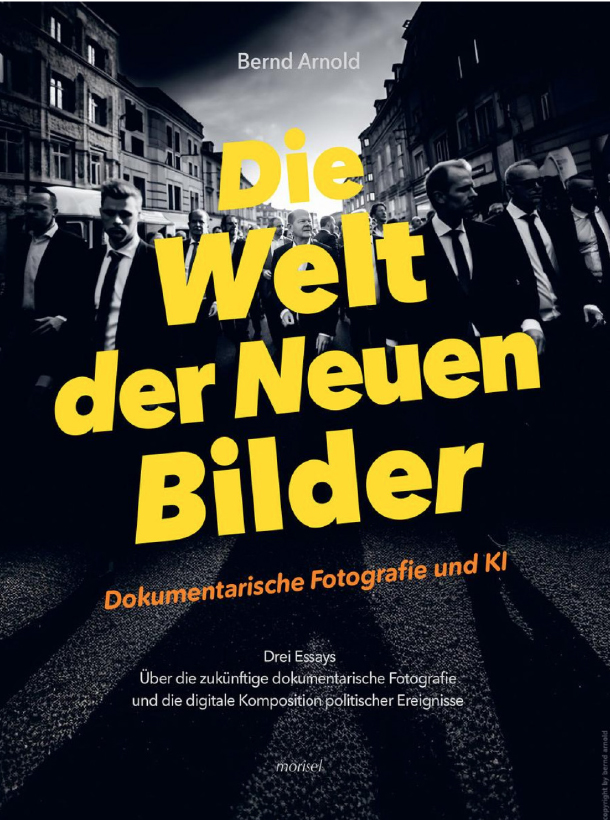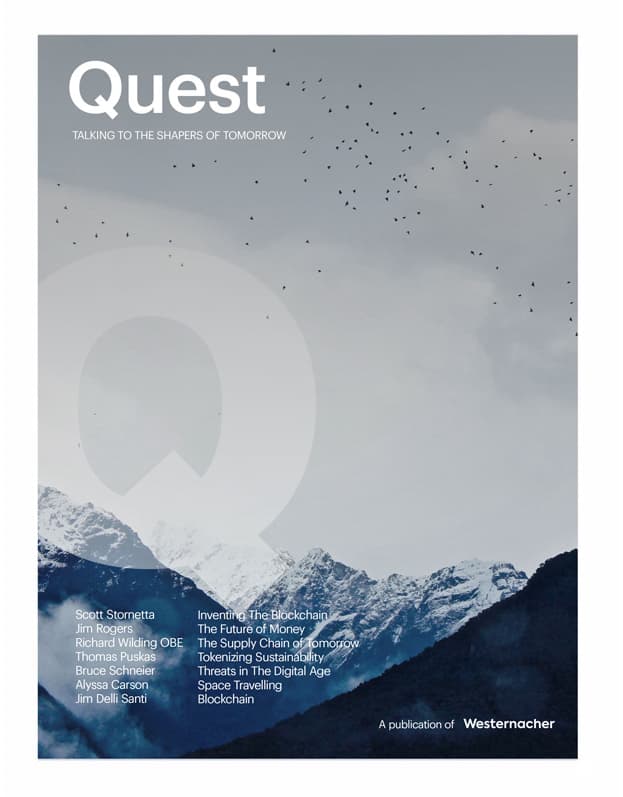Quest: You’ve chosen a very reflective approach to your work, especially in addressing topics like AI and photography. What led you to write your latest
book? Why is this topic so important to you?
Bernd Arnold: The book has been a long time in the making. I began studying photography in 1983 when analog photography was still the norm. But even then, developments toward digital photography were underway. I saw the first digital camera at Photokina around 1985 or 1986, and that marked the beginning of my interest in the transition from analog to digital photography. Analog photography carries a physical trace of light on a negative, while digital deconstructs that trace into zeros and ones, making it virtual. This shift is monumental.
In 1988, I wrote a theoretical paper predicting that the authenticity of photography would eventually be fundamentally questioned, starting with the advent of digital cameras.
About four years ago, I revisited this topic, exploring how manipulated images during election campaigns could blur the line between real and fabricated. When AI emerged, it became clear that any photograph could be AI-generated, making it impossible to distinguish between reality and imitation. This development changes everything, including our perception of photography as a transparent record of reality.
The rapid progress of AI, which I expected to occur around 2030, happened much sooner. By 2023, I felt compelled to address this shift in documentary photography.

In 2023, an AI-generated image won first place in a photography competition before organizers realized it wasn’t a real photo. This sparked debates about the definition of photography.
The German artist Boris Eldagsen revealed on his website that he was not accepting the prize for the creative open category, which he won at the Sony world photography awards.
The winning photograph depicted two women from different generations in black and white.
Quest: With the speed at which AI is advancing,
how do you see it impacting the authenticity and essence of photography?
Bernd Arnold: This development impacts every aspectof photography, including its authenticity. For example, publishers and magazines now use AI-generated images instead of hiring photographers, as AI is much cheaper. While this is a challenge, I see it as an opportunity to explore new creative tools. AI will dominate artificial worlds, but it can never replicate the “trace” left by analog photography—the direct connection to reality.
AI’s rise will create a counter-movement, a growing demand for authenticity. Documentary photography, with its ability to capture past realities, will gain importance as a reference to the real world. This connection to reality is something AI cannot replicate. For instance, the plaster casts of Pompeii victims are traces of past realities, akin to photojournalism in three dimensions. Such traces are irreplaceable and uniquely human.
Quest: Your book features AI-generated images of Olaf Scholz during the election campaign. What message were you trying to convey through these images?
Bernd Arnold: The images of Olaf Scholz in the book are entirely AI-generated, depicting situations that never happened. These images are designed to look like reportage photography, and while we might notice minor flaws today, in a few years, AI’s perfection will make them indistinguishable from reality.
What’s fascinating about AI-generated images is their temporal fluidity. Photography captures a moment that immediately becomes the past. AI images, however, exist in the past, present, and future simultaneously. The images in my book serve as metaphors for this AI-driven future, illustrating how these technologies will reshape our perception of time and reality.
Quest: Do you see AI posing challenges to the credibility of images in journalism and politics, especially during critical events like election campaigns?
Bernd Arnold: Absolutely. AI challenges the concepts of truth and reality. Photography has always been mistaken for truth, but even analog photographs depend on the photographer’s perspective and interpretation. With AI, this connection to reality is completely severed, creating a dangerous blend of reality and fantasy that’s difficult to distinguish.
For example, a plausible AI-generated image of a politician could mislead the public. Media outlets will eventually have to decide whether they focus on real images or AI-generated ones. Mixing the two will erode trust. In politics, this lack of distinction could amplify misinformation and disinformation, undermining public trust in journalism and democracy itself.
Quest: Beyond documentary photography, what other areas do you think will be most affected by AI?
Bernd Arnold: AI will impact every photographic domain, particularly commercial and corporate sectors, where cost efficiency often outweighs authenticity. This shift continues the digital revolution, making it easier for anyone to create convincing visuals without the expertise previously required. Photography has always expanded our perception of reality. It allows us to see things we couldn’t perceive unaided, like high-speed photography capturing a bullet passing through an apple. These innovations shaped how we understand the world. AI, however, creates imitations detached from reality, signalling a move away from scientific enlightenment toward a world driven by belief and constructed realities. This poses a fundamental challenge to how humanity perceives and understands the world.
Lil Miquela, an AI-generated influencer, has millions of followers and has even landed brand endorsements, blurring the line between reality and digital artistry in the photography world.
Quest: Do you think AI-generated visuals could push society toward a less reality-based worldview?
Bernd Arnold: Yes, that’s a significant concern. Photography has always provided a direct, albeit subjective, trace of reality. AI replaces this with entirely fabricated worlds, making it harder to discern what is real. This shift risks steering society away from empirical understanding toward a reliance on belief and constructed narratives.
The challenge lies in educating people about these changes and reinforcing the importance of factbased journalism and authentic imagery. Without this awareness, the line between reality and fabrication will continue to blur, with profound implications for our collective understanding of truth.

Bernd Arnold
The World of New Images: Documentary photography and AI Artificial intelligence creates completely new possibilities in the creation of images. For the first time, all the imaging techniques of art history have been brought together in a single tool that can be used by any computer user without any special expertise. A discussion about these issues is overdue, considering that trust in the authenticity of photographs has helped shape human history for almost 200 years. Images can be created that look like photographs but are not. What does this mean for photography in general and documentary photography in particular?
They can be used to create images that look like photographs but are not. What does this mean for photography in general and documentary photography in particular? A discussion about these questions is overdue, considering that trust in the authenticity of photographs has helped shape human history for almost 200
years.
Bernd Arnold, author and photographer of “Das Kölner Heil” and “Wahl Kampf Ritual”, is convinced that we will enter a New World when authentic photos and AI-generated photographic imitations compete with each other in forming our view of the world and history. In three essays, he analyzes the technological and perceptual history of photography, explains the new and innovative nature of AI and looks at the future role of documentary photography and its producers. For the phenomenon of photographic imitations, he introduces the term “dichography”, which describes a parallel universe of fictional reality that will soon be indistinguishable from the photographic light traces of pastreality.
Bernd Arnold, born in Cologne in 1961. Studied photography at Dortmund University of Applied Sciences and Arts. Graduated in 1990 with a series of pictures of the Cologne demimonde. Since then, Arnold has worked
continuously on aspects of
German society with a focus on religion, politics, the demimonde, the media and the business world. He organizes his work into cycles such as “Power and Ritual” or “Digitalis”.
Book publications include: Das Kölner Heil (1997), Wahl Kampf Ritual (2013), Die Welt der Neuen Bilder (2023).
Exhibitions including: Magie
der Straße: Meisterwerke der
Street Photography at Ernst
Leitz Museum Wetzlar (2025),
Bilderstrom – Der Rhein und die Fotografie 2016-1853 at LVRLandesMuseum Bonn (2016), Augen Auf! – 100 Jahre Leica at Deichtorhallen Hamburg (2014), Macht und Ritual at Stadtmuseum Köln (2006).
Member of the German
Photographic Society (DGPh), the German Photographic Academy (DFA) and VISUM – Agency for Photography.
www.berndarnold.photography

